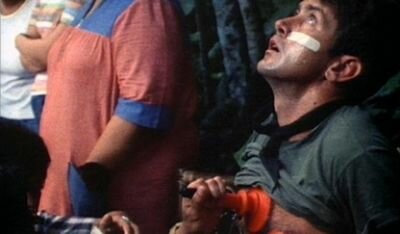|
|
| Tookey's Review |
|
| Pro Reviews |
|
| Mixed Reviews |
|
| Anti Reviews |
|
| Cast |
|
| |
 |
| |
| Released: |
1991 |
| |
|
| Genre: |
DOCUMENTARY
|
| |
|
| Origin: |
US |
| |
|
| Colour: |
C |
| |
|
| Length: |
97 |
|
| |
|
| |
|
|
| |
|
The nightmarish story of how Coppola made Apocalypse Now.
|
Reviewed by Chris Tookey
|
|
|
| Warren Beatty has described film-making as "like trying to keep a 95,000-ton souffle from falling". Francis Ford Coppola says it's like attempting to walk on a floor covered with vaseline. Hearts of Darkness: A Film-Maker's Apocalypse shows why it's more dangerous than that. This documentary tells such an amazing story that it should appeal to many more people than just film-buffs. |
| Coppola's production was dogged by disasters, some of them self-made. Coppola had to reshoot after he fired the leading man (Harvey Keitel); on location in the Philippines, the crew found themselves in a civil war between President Marcos and guerillas; a typhoon wrecked most of the film's sets, and the new leading man (Martin Sheen) almost died of a heart attack; the guest star, Marlon Brando, threatened to pull out and then arrived overweight, underprepared, and unwilling to perform the part as written, so that scenes involving him had to be improvised (one reason why the feature film itself becomes grossly distended in the final half hour). Other actors performed scenes drunk or on drugs. |
| It's hardly surprising that Coppola, who was risking his personal fortune on the project, ended up having a nervous breakdown and a near-fatal seizure. The film ultimately took three and a half years to complete, by which time it was horribly over-budget and known in Hollywood as Apocalypse When? |
| Such a story would be interesting in itself, but it's all the more resonant since it reflects not only the theme of Apocalypse Now - one man's descent into a self-created hell - but also the entire history of the Americans in Vietnam. Even Coppola sees the ironic comparison: 'My film is not about Vietnam,' he says, 'it is Vietnam... We were in the jungle; there were too many of us; we had access to too much money, too much equipment; and little by little we went insane'. |
| Co-directors Fax Bahr and George Hickenlooper organize the original material (shot while the feature was made by Coppola's wife Eleanor) with great intelligence, and have succeeded in gaining access 14 years later to almost all the principals, who look back on the experience with humorous detachment. |
| The hero of the documentary emerges as Coppola's wife, apparently willing - even enthusiastic - to lose everything in order to support her husband's artistic quest. Coppola himself is a surprisingly sympathetic, though chaotic, anti-hero: no one can doubt his courage or commitment, and there's considerable pathos in the fact that he has never risen to such heights again. Always intriguing and often hilarious, this is the best film about a film ever made. |
|
|
|
|
